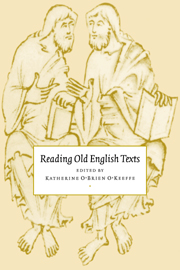Book contents
- Frontmatter
- Contents
- List of contributors
- List of abbreviations
- Note on the text
- Introduction
- 1 The comparative approach
- 2 Source study
- 3 Language matters
- 4 Historicist approaches
- 5 Oral tradition
- 6 The recovery of texts
- 7 At a crossroads: Old English and feminist criticism
- 8 Post-structuralist theories: the subject and the text
- 9 Old English and computing: a guided tour
- Suggestions for further reading
- Index
Introduction
Published online by Cambridge University Press: 18 December 2009
- Frontmatter
- Contents
- List of contributors
- List of abbreviations
- Note on the text
- Introduction
- 1 The comparative approach
- 2 Source study
- 3 Language matters
- 4 Historicist approaches
- 5 Oral tradition
- 6 The recovery of texts
- 7 At a crossroads: Old English and feminist criticism
- 8 Post-structuralist theories: the subject and the text
- 9 Old English and computing: a guided tour
- Suggestions for further reading
- Index
Summary
This is a book about ways of reading Old English, each of which presupposes a set of interpretative practices. Each of the essays which follow undertakes to describe and argue for a specific current approach (= a set of practices) with the understanding that reading within that approach produces a particular kind of outcome. In this sense, each approach might be imagined as a different sort of lens (perhaps even, at times, a filter) which permits the reader to visualize and comprehend differentially particular objects in a complex field. Each approach, whether it be through, for example, oral traditional criticism, source work, feminist criticism, or historicist analysis, constructs itself within two sets of conversations, one with the past from which it wishes to be distinguished, and one with the present, where it wishes to differentiate itself from other contemporary approaches. Thus, to understand an argument for something, it is necessary to understand the often unspoken conversations and quarrels that argument assumes. The most pressing among these exchanges concern the proper approach to and utility of the past, broadly conceived.
We might begin with two contemporary, but complementary, notions of engagement with the past, whose complex negotiations of objectivity and desire have, in their own ways and at different times, shaped our interpretation of the past. The first must be envisioned as a scene: the public funeral in 1870 of a leader of the French resistance during the Franco-Prussian War.
- Type
- Chapter
- Information
- Reading Old English Texts , pp. 1 - 19Publisher: Cambridge University PressPrint publication year: 1997



